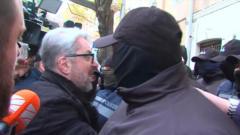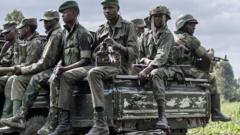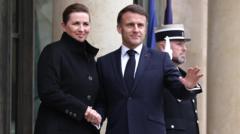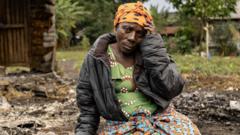Violent clashes between police and protesters have escalated in Tbilisi, leading to the detention of prominent opposition leaders and a warning from the Prime Minister about those involved in organizing protests.
Georgia's Political Turmoil: Opposition Leaders Face Crackdown Amid Protests

Georgia's Political Turmoil: Opposition Leaders Face Crackdown Amid Protests
Rising tensions in Georgia as opposition figures are targeted by authorities amidst ongoing pro-EU demonstrations.
The article text:
Amid escalating tensions in Georgia, the country's opposition is facing a brutal crackdown from the government. Nika Gvaramia, a leader of the Coalition for Change, was forcibly removed from his party headquarters by police, triggering a series of attacks on fellow opposition members. These events come in the wake of a week-long wave of pro-EU protests sparked by Prime Minister Irakli Kobakhidze's announcement to halt negotiations for EU membership, branding the demonstrations as "violent actions".
The political landscape in Tbilisi has grown increasingly volatile since the Prime Minister's remarks, leading to nightly protests and over 330 arrests. Reports of brutality against detained individuals have raised concerns among human rights organizations. Gvaramia warned that the opposition would continue to fight against the perceived threat of regressing into Russia's sphere of influence, stating, "The alternative is the elimination of our country."
The government's growing authoritarianism has been criticized by various international observers, particularly following a contested election characterized by significant irregularities. In response to the protests, opposition groups are mobilizing to advocate for a general strike and increased public awareness of their cause.
The situation has led to high-profile resignations within the Georgian Dream party, including several ambassadors and senior officials expressing dissatisfaction with the current direction of the government. As tensions mount, Gvaramia and other opposition leaders face the daunting reality of arrests and violence, even as they strive to unite the public against perceived injustices. In the words of Strong Georgia leader Levan Tsutskiridze, "It's a total campaign of terror against free speech and democracy."
As protests continue across the nation, the outcome remains uncertain. The government’s response suggests a willingness to use force against dissent, raising alarm among citizens and rights advocates alike.
Amid escalating tensions in Georgia, the country's opposition is facing a brutal crackdown from the government. Nika Gvaramia, a leader of the Coalition for Change, was forcibly removed from his party headquarters by police, triggering a series of attacks on fellow opposition members. These events come in the wake of a week-long wave of pro-EU protests sparked by Prime Minister Irakli Kobakhidze's announcement to halt negotiations for EU membership, branding the demonstrations as "violent actions".
The political landscape in Tbilisi has grown increasingly volatile since the Prime Minister's remarks, leading to nightly protests and over 330 arrests. Reports of brutality against detained individuals have raised concerns among human rights organizations. Gvaramia warned that the opposition would continue to fight against the perceived threat of regressing into Russia's sphere of influence, stating, "The alternative is the elimination of our country."
The government's growing authoritarianism has been criticized by various international observers, particularly following a contested election characterized by significant irregularities. In response to the protests, opposition groups are mobilizing to advocate for a general strike and increased public awareness of their cause.
The situation has led to high-profile resignations within the Georgian Dream party, including several ambassadors and senior officials expressing dissatisfaction with the current direction of the government. As tensions mount, Gvaramia and other opposition leaders face the daunting reality of arrests and violence, even as they strive to unite the public against perceived injustices. In the words of Strong Georgia leader Levan Tsutskiridze, "It's a total campaign of terror against free speech and democracy."
As protests continue across the nation, the outcome remains uncertain. The government’s response suggests a willingness to use force against dissent, raising alarm among citizens and rights advocates alike.





















